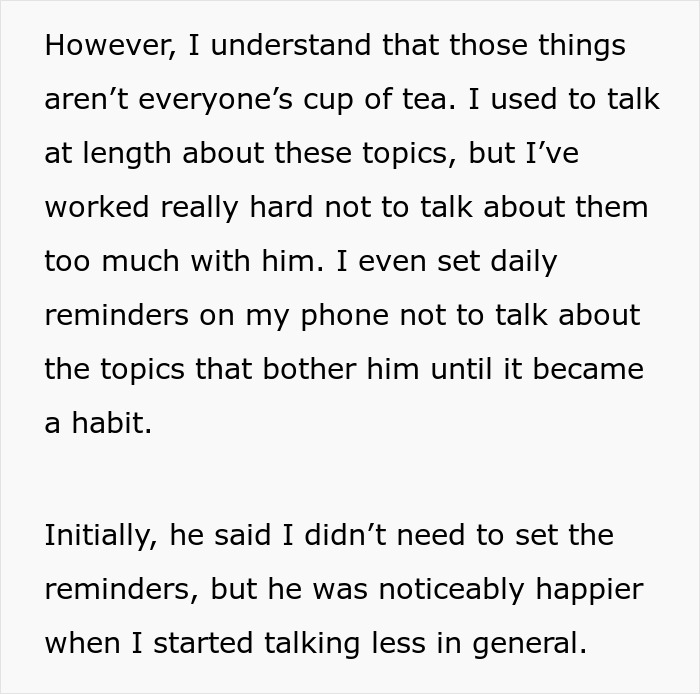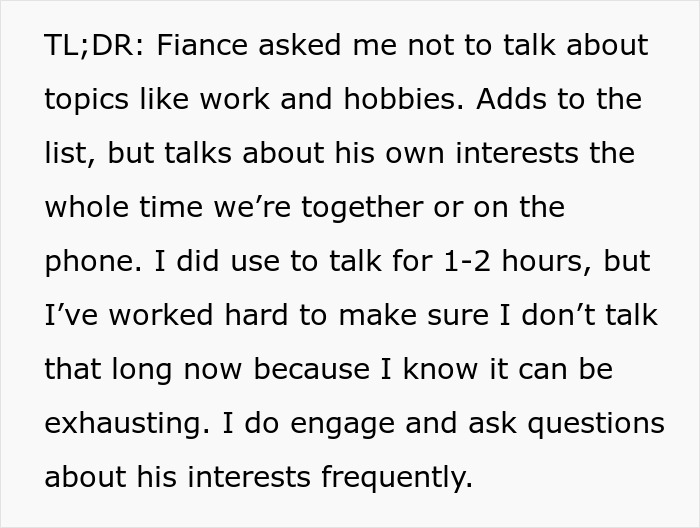While some folks might say that love can transcend language barriers, it’s still common sense to assume that any long term relationship does generally require both people to actually like talking to each other. So learning that your partner has a whole set of “banned” topics might seem strange.
A woman asked the internet for some advice after her fiancé laid out a list of topics he didn’t want her to talk about, including her work, her hobbies, their wedding and her new cat. We reached out to the woman who shared the post via private message and will update the article when she gets back to us.
Some folks have certain things they don’t want to talk about

Image credits: Curated Lifestyle / Unsplash (not the actual photo)
But a woman was taken aback when her fiancé started banning multiple conversation topics




Image credits: olganosova / Freepik (not the actual photo)





Image credits: Liza Summer / Pexels (not the actual photo)





Image credits: Curated Lifestyle / Unsplash (not the actual photo)




Image credits: ThrowRA58393738
Even if communicated “reasonably,” banning so many topics is a red flag
When someone insists on prohibiting certain topics from being discussed, work, perhaps, or hobbies or past experiences, or topics of interest, it may be a sign of a more profound issue with how communication and respect are being received in the relationship. Open discussion is a building block of trust and closeness; if topics are off-limits, that means one may be trying to control or limit actual exchange rather than fostering understanding and connection. Suppressing discussion of areas of one’s life can erode authenticity. One’s occupation and leisure activities define who one is, what one values, and one’s sense of self. To insist on silence regarding these areas from a partner is to close off a complete understanding of the other. Over time, this acts against self-expression, as the partner will be driven to hide or even squash significant areas of life in order to avoid disagreement or disapproval, which breeds resentment and distance.
Banning subjects can convey insecurity or judgment anxiety. When someone becomes defensive when certain things are mentioned, it indicates that he or she is uncomfortable with aspects of his or her partner’s world or unsure about his or her place within it. Rather than open communication to resolve the insecurities, they shut down discussion, and therefore no progress and insight occur. Healthy relationships accommodate diversity of experience and view, not evasion. This trend can also signal controlling dynamics. When a partner controls what can or cannot be discussed, power is removed from an equal exchange to that of dominating and obeying. Even when phrased as “I just don’t like that subject,” the implicit message is “you have to please my tastes.” Over time, these little bans can escalate into prohibiting things here and there and having the restricted partner become hyper-sensitive to transgressing into forbidden spaces, taking away their freedom and creating an anxiety-ridden rather than a warm atmosphere.
Lets face it, not talking about work or hobbies can be harder than it seems. Work is typically stressful, successful, or challenging; hobbies are happy, artistic, and sociable. People like talking about these things, albeit for different reasons. Talking about these things allows the partners to empathize, celebrate successes, or offer comfort. We want to communicate, particularly with people we like. If those channels are blocked, opportunities for emotional connection and reassurance are lost. The relationship risks being shallow, only talking engaged in “safe” conversation, and lacking the depth supplied by shared empathy in varied situations.

Image credits: cookie_studio / Freepik (not the actual photo)
Underneath this request might be a desire to control
“Forbidden” topics can be masking hidden disagreements or incompatible values. If a person forbids discussion of his own past errors or financial affairs in the work setting, for instance, it can mask habits that land one in deep trouble in the future. If time-consuming or costly pursuits are prevented from being discussed, it can indicate hidden disagreement regarding priorities or funds. These differences must be discussed openly to reconcile expectations; forbidding them merely postpones or conceals them.
Communication limits are not in of themselves bad, but blanket prohibitions differ from negotiated boundaries. When there are healthy dynamics, partners can accept that there are some things that are too sensitive at specific times or need delicate timing; they negotiate mutual agreement on when and how to bring them up. A one-sided dictate to never speak of something, however, is not negotiated and not respectful. It communicates unwillingness to work together in addressing problems and indicates an unevenness in the appreciation of each voice.
Acknowledging this red flag early on allows considering communication styles and compatibility. One must respectfully but firmly ask why certain subjects are off-limits. Is there insecurity, discomfort, or the attempt at control? Being able to have a calm discussion about how openness is essential can determine if the partner is willing to work on exploring and changing the dynamic. If they continue to ban meaningful subjects unjustly or without understanding, it could be a sign of deeper patterns of relating that can destroy trust and equality over the long term. Overall, requiring portions of life to remain unsaid threatens authenticity, empathy, and respect. Periodic sensitivity to timing or emotional readiness might be appropriate, but blanket bans on discussing work, leisure activities, or other identity facets imply control, insecurity, or avoidance. Attentiveness to this trend at the outset is critical to establishing a relationship premised upon unguarded communication, trust, and genuine connection.
Readers had some thoughts and suggestions, while the woman could actually speak her mind













Some thought that his behavior was a red flag
















